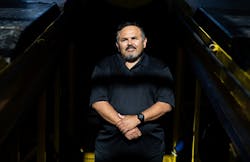SHOP STATS: Pro Auto Care Location: Denver and Littleton, Colo. Operator: Al Oramas Average Monthly Car Count: 330 (combined) Staff Size: 20 (total) Shop Size: Denver: 8,000 sq ft, Littleton 4,300 sq ft Annual Revenue: Denver: $2.5 million, Littleton: $1.5 million
What obstacles would you overcome to take care of your customers? When it comes to your work in the automotive industry, what are you willing to risk to show that you’re there for your customer?
For Al Oramas, it’s worth losing a job over.
“My customer was always No. 1,” he says.
Six months prior to opening Pro Auto Care in 1992, a now two-shop operation in Denver and Littleton, Colo., Oramas worked at a dealership where he was fired after butting heads with management.
“The driving force behind me actually opening up my store was the fact that I was fired from my job at the dealership because I chose not to be unethical,” Oramas says. “The basis of me opening up my store was to do it right.”
Oramas started the business in his garage and after developing a following from the dealership—results came quickly. In a matter of four years, Oramas’ one-bay, 2,800-square-foot shop expanded to a 16-bay shop, doubling in square footage at the same location.
“We maxed out techs with work,” Oramas says. “We needed to hire additional help, which meant we needed more lifts.”
Following the additional bays, Oramas’ car count increased nearly 30 percent, he says. For Oramas, his customers have presented new opportunities for the shop, and through the lessons he has learned during the process, Pro Auto Care has been able to expand to a second location.
Lesson No. 1: If you’re curious, investigate.
Oramas’ team takes notice when a familiar face hasn’t been to the business in a while. In the early years, he wanted to better understand customer habits, so he invested in what he calls a “lost customer report,” which has morphed over the years.
The business remembers customers—whether it’s identifying the customer by name or a memory—and the process was inspired by Oramas’ realization that a certain customer hadn’t been into the shop in a while. Initially, the shop picked up the phone and called up a handful who explained their absences: The shop was too far away or their schedules had become too hectic, Oramas learned.
Through the “lost customer report,” he discovered that, seven years after the move, 800 customers had not returned to the shop in 15 months.
“I about fell over,” Oramas says.
To find out why customers were absent from the business, he sent out “Miss You” letters to invite customers back in or share the reason why they hadn’t been back. After offering a free oil change incentive to respond, Oramas learned why customers were not making it back into the shop.
“Multiple people picked up the phone and said, ‘I’ve been meaning to call you. You did nothing wrong, it’s just life has gotten too busy [and] it’s just not as convenient,’” he says.
Postage data additionally revealed that the shop was not reaching customers on the south side of the city. In order to grow the business and potentially reach a whole new customer base, Oramas began digging into the possibility of adding a second location.
“Like many shop owners, I’m a risk taker,” he says. “The ability to build something just got my juices going.”
Lesson No. 2: Take your time.
A few years later, after doing some research, Oramas decided to look into purchasing a second location in Littleton, Colo., as a way to better improve the business model. According to Oramas, it took 10 years to find the perfect shop.
“There were multiple things that happened in those 10 years,” he says.
Plans to sublease land with a rental car company on a previous auto dealership’s property became too complicated and the cost of building a shop on land Oramas purchased was extremely expensive.
“I don’t want to move so quickly that I hurt myself; bigger is not always better, and lean and mean is sometimes the best way,” he says. “Sometimes we think we have this mojo that just because we do it, it just happens and it just goes well—that’s not true. You have to work so hard [to] make it successful. You sometimes are not anticipating some of that extra work and time that you have to put in because it’s the unknown.”
Lesson No. 3: Mirror your processes.
When Pro Auto Care 2 took up shop in Littleton, the business became neighbors with a local community college, adding both college students and staff members as new clients. Today, the shop has a total of six staff members at the business, and according to Oramas, the second location has brought in around 350 new customers.
“We did $660,000 in sales the first year and we were fortunate,” he says.
Although the second store was new, the procedures that were in place made the transition smooth for staff and customers. He says it’s important to have key personnel on hand that can keep your business running.
According to Oramas, his coach encouraged him to write up policies and procedures before the move. Procedures helped smooth the transition, he says. Initially, one fear that he had regarding a second location was losing customers to the new shop, he says.
“One of the biggest things we were really concerned about at first was how many customers currently coming to Denver would move [to the Littleton shop],” Oramas says.
The shop found that only 8.5 percent of monthly customers at Littleton came from the Denver shop.
He says he had to really think about what his procedures were at the business and determine whether processes were head-knowledge or written down and part of the shop’s flow.
“We had written up so much,” Oramas says. “My coach had us spend literally a year and a half writing policy and procedure [and] that helped so much.”
Lesson No. 4: Open your communication channels.
A little over a year ago, Oramas’ shops decided to offer 24/7, 365-day service for customers. According to Oramas, customers can either message the shop from the site, or make a call to an after-hours assistance line.
“I don’t think anyone calls us to get out of a bad situation,” he says. “They go online and they can message us right from the website, and they’ll schedule: ‘Hey, car broke down and I’m expecting to tow it to the shop on Monday.’ We get messages like that all the time.”
Staff members are able to receive messages through a downloaded app, Oramas says, where messages come in from the site. However, responsibility is left up to key personnel—such as the manager or assistant manager—from each store to respond back to the customer.
“The beauty of the app is that when someone responds we all see it,” he says.
According to Oramas, the shop has gotten more weekend leads from the system.
Lesson No. 5: Bring your community in.
To create ease and awareness about repair, Oramas developed a partnership with CarCare.org under “National Car Care Month,” where the shop offers car care clinics in both April and October. According to Oramas, during the car care clinics, the shop covers a variety of topics pertaining to auto repair.
“We have great attendance and people really like it,” he says.
Additionally, the shop focuses on community involvement and strives to support local organizations. According to Oramas, the shop supports local sports teams and charities in the area to give back.
“We’re just constantly trying to be part of the community and our customers see that,” Oramas says.

